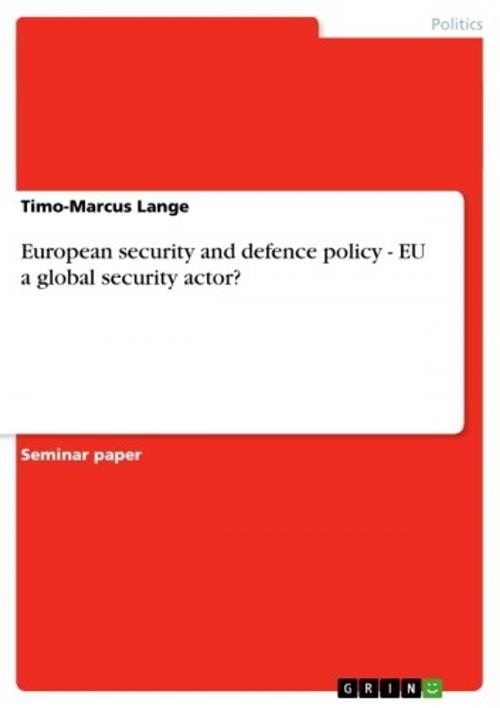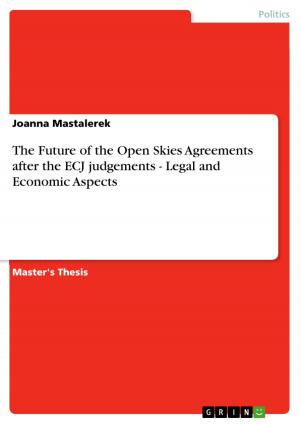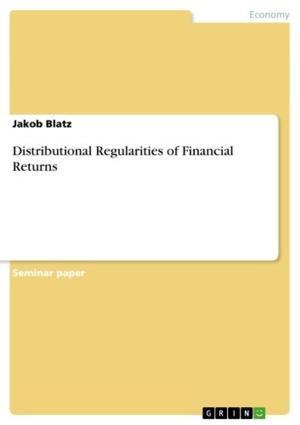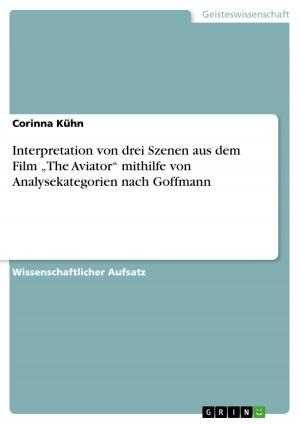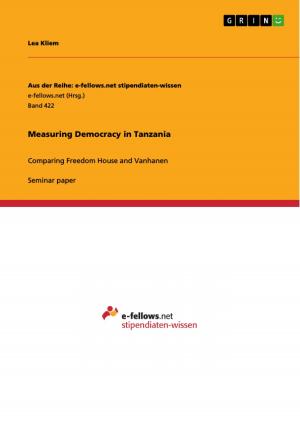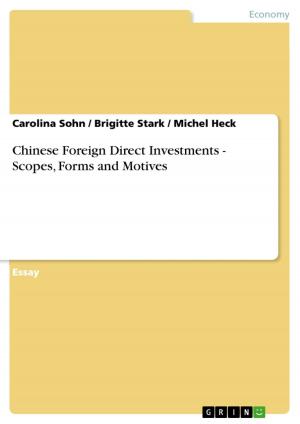European security and defence policy - EU a global security actor?
EU a global security actor?
Nonfiction, Social & Cultural Studies, Political Science| Author: | Timo-Marcus Lange | ISBN: | 9783638830232 |
| Publisher: | GRIN Publishing | Publication: | July 25, 2007 |
| Imprint: | GRIN Publishing | Language: | English |
| Author: | Timo-Marcus Lange |
| ISBN: | 9783638830232 |
| Publisher: | GRIN Publishing |
| Publication: | July 25, 2007 |
| Imprint: | GRIN Publishing |
| Language: | English |
Seminar paper from the year 2006 in the subject Politics - International Politics - Topic: European Union, grade: 1,3, RWTH Aachen University (Institut für Politische Wissenschaft), course: Die Europäische Union am Anfang des 21.Jahrhundert , 40 entries in the bibliography, language: English, abstract: Fundamentalism, war and armed conflicts are fuelling international terrorism. Poverty and disease, economical and political problems lay grounds for failed states. Despite ever growing globalisation and interdependencies the world seems not to have adequate international institutions to combine their power; nation states are unable to respond suitably. American global leadership seems to be faltering due to ambivalent management of the 'war against terror', the war in Iraq and due to growing lack of interest. European Union is divided in Euro-sceptic and pro-Europe Member states. Regardless of the announced commitment to multilateralism and common action, notably in reference to the United Nations, the Member states seem not even capable to deal sufficiently with their inner disunity in matters of international politics. The European Union's Common Foreign and Security Policy and the included European Security and Defence Policy could be the right instruments to meet the identified threats. But what has been done till now? How is a defence and security policy, the ultimate base for national security and sovereignty, implemented into a common European framework? This term paper shall give, within its scope, at first a short insight in the development of European Security and Defence Policy. In the following three major aspects in respective to European Security and Defence Policy shall be addressed. First, European Security Strategy and the impact on European Security and Defence Policy; is a shared strategy adequate to forge all European Member states into unity? Second, the interconnexion of European defence and NATO; how does an emancipated European Security and Defence Policy interact with NATO and hence with the United States of America? Third, the fourth part will deal with the implication of European Security and Defence Policy and the Constitutional Treaty of European Union as well as the prospects after the failure of the ratification process of the Constitutional Treaty. Is it possible to keep the, so hard fought for, existing framework of European Security and Defence Policy intact? Finally, regarding its volume, this term paper shall account, a possible future of European Security and Defence Policy. Are there enhanced efforts under way to allow a common European approach to the threats of today and perhaps tomorrow? And what are further steps?
Seminar paper from the year 2006 in the subject Politics - International Politics - Topic: European Union, grade: 1,3, RWTH Aachen University (Institut für Politische Wissenschaft), course: Die Europäische Union am Anfang des 21.Jahrhundert , 40 entries in the bibliography, language: English, abstract: Fundamentalism, war and armed conflicts are fuelling international terrorism. Poverty and disease, economical and political problems lay grounds for failed states. Despite ever growing globalisation and interdependencies the world seems not to have adequate international institutions to combine their power; nation states are unable to respond suitably. American global leadership seems to be faltering due to ambivalent management of the 'war against terror', the war in Iraq and due to growing lack of interest. European Union is divided in Euro-sceptic and pro-Europe Member states. Regardless of the announced commitment to multilateralism and common action, notably in reference to the United Nations, the Member states seem not even capable to deal sufficiently with their inner disunity in matters of international politics. The European Union's Common Foreign and Security Policy and the included European Security and Defence Policy could be the right instruments to meet the identified threats. But what has been done till now? How is a defence and security policy, the ultimate base for national security and sovereignty, implemented into a common European framework? This term paper shall give, within its scope, at first a short insight in the development of European Security and Defence Policy. In the following three major aspects in respective to European Security and Defence Policy shall be addressed. First, European Security Strategy and the impact on European Security and Defence Policy; is a shared strategy adequate to forge all European Member states into unity? Second, the interconnexion of European defence and NATO; how does an emancipated European Security and Defence Policy interact with NATO and hence with the United States of America? Third, the fourth part will deal with the implication of European Security and Defence Policy and the Constitutional Treaty of European Union as well as the prospects after the failure of the ratification process of the Constitutional Treaty. Is it possible to keep the, so hard fought for, existing framework of European Security and Defence Policy intact? Finally, regarding its volume, this term paper shall account, a possible future of European Security and Defence Policy. Are there enhanced efforts under way to allow a common European approach to the threats of today and perhaps tomorrow? And what are further steps?
